|
Books Should Be Free Loyal Books Free Public Domain Audiobooks & eBook Downloads |
|
|
Books Should Be Free Loyal Books Free Public Domain Audiobooks & eBook Downloads |
|
Tragedies |
|---|
Book type:
Sort by:
View by:
|
By: Aeschylus (c. 525/524-456/455 BC) | |
|---|---|
 Prometheus Bound (Browning Translation)
Prometheus Bound (Browning Translation)
Whether or not it was actually written by Aeschylus, as is much disputed, "Prometheus Bound" is a powerful statement on behalf of free humanity in the face of what often seem like the impersonal, implacable Forces that rule the Universe. As one of the most compelling rebel manifestos ever composed, it has appealed not only to the expected host of scholars of Greek drama, but also to a fascinatingly free-spirited array of translators, especially since the early 19th century; Percy Bysshe Shelley, Henry David Thoreau, and activist-poet Augusta Webster are among those who have tried their poetic and linguistic powers at rendering it into English... | |
 Agamemnon (Browning Translation)
Agamemnon (Browning Translation)
The play Agamemnon details the homecoming of Agamemnon, King of Argos, from the Trojan War. Waiting at home for him is his wife, Clytemnestra, who has been planning his murder, partly as revenge for the sacrifice of their daughter, Iphigenia, and partly because in the ten years of Agamemnon's absence Clytemnestra has entered into an adulterous relationship with Aegisthus, Agamemnon's cousin and the sole survivor of a dispossessed branch of the family (Agamemnon's father, Atreus, killed and fed Aegisthus's brothers to Aegisthus's father, Thyestes, when he took power from him), who is determined to regain the throne he believes should rightfully belong to him. | |
 Furies (Morshead Translation)
Furies (Morshead Translation)
The Oresteia is a trilogy of Greek tragedies written by Aeschylus concerning the end of the curse on the House of Atreus. The name derives from the character Orestes, who sets out to avenge his father's murder. The only extant example of an ancient Greek theater trilogy, the Oresteia won first prize at the Dionysia festival in 458 BC. When originally performed, it was accompanied by Proteus, a satyr play that would have followed the trilogy. Proteus has not survived, however. In all likelihood the term "Oresteia" originally referred to all four plays; today it generally designates only the surviving trilogy... | |
 Agamemnon (Morshead Translation)
Agamemnon (Morshead Translation)
The Oresteia is a trilogy of Greek tragedies written by Aeschylus concerning the end of the curse on the House of Atreus. The name derives from the character Orestes, who sets out to avenge his father's murder. The only extant example of an ancient Greek theater trilogy, the Oresteia won first prize at the Dionysia festival in 458 BC. When originally performed, it was accompanied by Proteus, a satyr play that would have followed the trilogy. Proteus has not survived, however. In all likelihood the term "Oresteia" originally referred to all four plays; today it generally designates only the surviving trilogy... | |
 Prometheus Bound (Thoreau Translation)
Prometheus Bound (Thoreau Translation)
Whether or not it was actually written by Aeschylus, as is much disputed, "Prometheus Bound" is a powerful statement on behalf of free humanity in the face of what often seem like the impersonal, implacable Forces that rule the Universe. As one of the most compelling rebel manifestos ever composed, it has appealed not only to the expected host of scholars of Greek drama, but also to a fascinatingly free-spirited array of translators, especially since the early 19th century; Percy Bysshe Shelley, Elizabeth Barrett Browning (two very different versions), and activist-poet Augusta Webster are among those who have tried their poetic and linguistic powers at rendering it into English... | |
 Libation-Bearers (Morshead Translation)
Libation-Bearers (Morshead Translation)
The Oresteia is a trilogy of Greek tragedies written by Aeschylus concerning the end of the curse on the House of Atreus. The name derives from the character Orestes, who sets out to avenge his father's murder. The only extant example of an ancient Greek theater trilogy, the Oresteia won first prize at the Dionysia festival in 458 BC. When originally performed, it was accompanied by Proteus, a satyr play that would have followed the trilogy. Proteus has not survived, however. In all likelihood the term "Oresteia" originally referred to all four plays; today it generally designates only the surviving trilogy... | |
 Seven Against Thebes (Way Translation)
Seven Against Thebes (Way Translation)
Seven against Thebes is the third play in an Oedipus-themed trilogy produced by Aeschylus in 467 BC. The trilogy is sometimes referred to as the Oedipodea. It concerns the battle between an Argive army led by Polynices and the army of Thebes led by Eteocles and his supporters. The trilogy won the first prize at the City Dionysia. The trilogy's first two plays, Laius and Oedipus, as well as the satyr play Sphinx, are no longer extant. When Oedipus, King of Thebes, realized he had married his own mother and had two sons and two daughters with her, he blinded himself and cursed his sons to divide their inheritance (the kingdom) by the sword... | |
 Suppliant Maidens (Morshead Translation)
Suppliant Maidens (Morshead Translation)
The Suppliants, also called The Suppliant Maidens, or The Suppliant Women, is a play by Aeschylus. It was probably first performed sometime after 470 BC. It was long thought to be the earliest surviving play by Aeschylus due to the relatively anachronistic function of the chorus as the protagonist of the drama. However, evidence discovered in the mid-20th century shows it one of Aeschylus' last plays, definitely after The Persians and possibly after Seven Against Thebes....The Danaids form the chorus and serve as the protagonists... | |
By: Anonymous | |
|---|---|
 King Leir and His Three Daughters
King Leir and His Three Daughters
King Leir is an anonymous Elizabethan play about the life of the ancient Celtic king Leir of Britain. It was published in 1605 but was entered into the Stationers' Register on 15 May 1594. The play has attracted critical attention principally for its relationship with King Lear, Shakespeare's version of the same story. | |
By: Benito Pérez Galdós (1843-1920) | |
|---|---|
 Electra
Electra
Originally staged in the Teatro Español in 1901, Electra is a controversial Spanish drama that documents the trials and tribulations of its innocent heroine. Electra is a young woman of unknown parentage who is raised in a convent in France and, after the death of her mother Eleuteria, adopted by her aunt and uncle. Electra soon falls in love with the scientist Maximo, but an intricate web of rumors and lies threatens to ruin their relationship. In this play, Benito Pérez Galdós tackles a number of hot-button themes: fanaticism, superstition, social justice, rationalism, and the powers of science. | |
By: Euripides (484 BC - 406 BC) | |
|---|---|
 Orestes
Orestes
In accordance with the advice of the god Apollo, Orestes has killed his mother Clytemnestra to avenge the death of his father Agamemnon at her hands. Despite Apollo’s earlier prophecy, Orestes finds himself tormented by Erinyes or Furies to the blood guilt stemming from his matricide. The only person capable of calming Orestes down from his madness is his sister Electra. To complicate matters further, a leading political faction of Argos wants to put Orestes to death for the murder. Orestes’ only hope to save his life lies in his uncle Menelaus, who has returned with Helen after spending ten years in Troy and several more years amassing wealth in Egypt... | |
 Iphigenia in Tauris (Murray Translation)
Iphigenia in Tauris (Murray Translation)
The apparent sacrifice of Iphigenia at Aulis by her own father Agamemnon was forestalled by the godness Artemis, who by an adroit sleight of hand that fooled all participants, substituted a deer for the daughter. Wafted magically away to the “Friendless Shores” of savage Tauris and installed as chief priestess presiding over the human sacrifice of all luckless foreigners, Iphigenia broods over her “murder” by her parents and longs for some Greeks to be shipwrecked on her shores so she can wreak a vicarious vengeance on them... | |
 Alcestis
Alcestis
Alcestis is the earliest surviving play by Euripides. Alcestis, the devoted wife of King Admetus, has agreed to die in his place, and at the beginning of the play she is close to death. In the first scene, Apollo argues with Thanatos (Death), asking to prolong Alcestis' life, but Thanatos refuses. Apollo leaves, but suggests that a man will come to Pherae who will save Alcestis. Euripides' play is perhaps the most unusual Greek drama ever written: a tragedy that is not a tragedy. | |
 Medea (Way Translation)
Medea (Way Translation)
Medea is an ancient Greek tragedy written by Euripides, based upon the myth of Jason and Medea and first produced in 431 BCE. The plot centers on the actions of Medea, a barbarian and the wife of Jason; she finds her position in the Greek world threatened as Jason leaves her for a Greek princess of Corinth. Medea takes vengeance on Jason by killing Jason's new wife as well as her own children with him, after which she escapes to Athens to start a new life. Considered shocking to the playwright's contemporaries, Medea and the suite of plays that it accompanied in the City Dionysia festival came last in the festival that year... | |
 Iphigenia in Aulis (Way translation)
Iphigenia in Aulis (Way translation)
Iphigenia in Aulis (Ancient Greek: Ἰφιγένεια ἐν Αὐλίδι) is the last extant work of the playwright Euripides. Written between 408, after the Oresteia, and 406 BC, the year of Euripides' death, the play was first produced the following year in a trilogy with The Bacchae and Alcmaeon in Corinth by his son or nephew, Euripides the Younger, and won the first place at the Athenian city Dionysia. The play revolves around Agamemnon, the leader of the Greek coalition before and during the Trojan War, and his decision to sacrifice his daughter, Iphigenia, to appease the goddess Artemis and allow his troops to set sail to preserve their honour in battle against Troy... | |
 Electra (Murray Translation)
Electra (Murray Translation)
Electra (the Unmated One) is eaten up with hatred of her mother Clytemnestra and stepfather Aegisthus for their murder of her father Agamemnon. Married platonically to a good-hearted but poverty-stricken old peasant, she longs for the return of her brother Orestes to help her wreak vengeance. Orestes finally returns and together they carry out their fated work, but find the result to be as tragically meaningless as the lust for vengeance had been poisonous. Strikingly different from Sophocles, who wrote his “Electra” with full sympathy for the divine ordinance of revenge, Euripides squarely blames the God Apollo for putting an evil commandment on the shoulders of the siblings... | |
 Trojan Women (Coleridge Translation)
Trojan Women (Coleridge Translation)
Described by modern playwright Ellen McLaughlin as "perhaps the greatest antiwar play ever written," "The Trojan Women," also known as "Troades," is a tragedy by the Greek playwright Euripides. Produced in 415 BC during the Peloponnesian War, it is often considered a commentary on the capture of the Aegean island of Melos and the subsequent slaughter and subjugation of its populace by the Athenians earlier that year. 415 BC was also the year of the scandalous desecration of the hermai and the Athenians' second expedition to Sicily, events which may also have influenced the author... | |
 Alcestis (Way Translation)
Alcestis (Way Translation)
Alcestis, queen of Pherae, is one of the noblest heroines in all of Greek drama. Her husband Admetus is the supposedly virtuous king of Pherae who wins the friendship of the god Apollo. Apollo tricks the Eumenides into an agreement that when the time comes for Admetus to die, a willing substitute will be accepted in his place, allowing his friend to go on living. Admetus selfishly tries to persuade anyone to agree to be his substitute, even his own parents, but no one is willing to make that sacrifice; this disappointment and its tragic consequences embitter him, leading him ultimately to disown his father and mother... | |
By: John Ford (1586-1639) | |
|---|---|
 'Tis Pity She's a Whore
'Tis Pity She's a Whore
One of the most shocking plays produced in England during the reign of Charles I, 'Tis Pity She's A Whore chronicles the disastrous results of an incestuous affair between fatalistic Italian siblings, Giovanni and Annabella. As suitors vie for Annabella's hand, various webs of deception and revenge intertwine, culminating in a bloody finale. CAST LISTBonaventura, a Friar/ Bergetto, Nephew to Donado: alanmapstoneA Cardinal, Nuncio to the Pope AND Banditti: Algy PugSoranzo, a Nobleman: tovarischFlorio,... | |
 Broken Heart
Broken Heart
The Broken Heart stands next to ‘Tis Pity She's a Whore as Ford's most popular drama. All is not right in Sparta because of, as is typical in this era of tragedies, the issue of marriage. In brief, Penthea wishes to marry Orgilus, but her brother Ithocles gets involved and bans them from doing so. He forces her to marry Bassanes, an abusive brute who happens to be wealthier than Orgilus. Ithocles then realises what he's done wrong and tries to get his friend Prophilus to marry Orgilus's sister Euphrania... | |
By: Sophocles (497 BC - 406 BC) | |
|---|---|
 Oedipus Rex (Murray Translation)
Oedipus Rex (Murray Translation)
"Oedipus Rex" (Ancient Greek: Οἰδίπους Τύραννος, Oidipous Tyrannos), also known as "Oedipus the King" or "Oedipus the Tyrant," is an Athenian tragedy by Sophocles that was first performed about 429 BC (noted classicist Gilbert Murray, translator of this version of the play, rendered the title as "Oedipus, King of Thebes"). It was the second in order of Sophocles's composition of his three plays dealing with Oedipus. Thematically, however, it was the first in the trilogy's historical chronology, followed by Oedipus at Colonus and then Antigone... | |
 Philoctetes (Campbell Translation)
Philoctetes (Campbell Translation)
Philoctetes is a play by Sophocles (Aeschylus and Euripides also each wrote a Philoctetes but theirs have not survived). The play was written during the Peloponnesian War. It is one of the seven tragedies of Sophocles to have survived the ravages of time in its complete form. It was first performed at the Festival of Dionysus in 409 BC, where it won first prize. The story takes place during the Trojan War (after the majority of the events of the Iliad, and before the Trojan Horse). It describes the attempt by Neoptolemus and Odysseus to bring the disabled Philoctetes, the master archer, with them to Troy. | |
 Electra (Storr Translation)
Electra (Storr Translation)
Electra or Elektra is a Greek tragedy by Sophocles. Its date is not known, but various stylistic similarities with the Philoctetes (409 BC) and the Oedipus at Colonus (401 BC) lead scholars to suppose that it was written towards the end of Sophocles' career. Set in the city of Argos a few years after the Trojan war, it recounts the tale of Electra and the vengeance that she and her brother Orestes take on their mother Clytemnestra and step father Aegisthus for the murder of their father, Agamemnon. | |
 Antigone (Plumptre Translation)
Antigone (Plumptre Translation)
A powerful artistic protest against tyranny, "Antigone" has been translated and adapted dozens of times, applied over and over through the centuries to current forms of the oppression so common to human experience. Antigone's heroic resistance to Creon's petty, capricious, and unbending law has a never-ending relevance even in the third millennium CE. The play was written at a time of national fervor. In 441 BC, shortly after the play was released, Sophocles was appointed as one of the ten generals to lead a military expedition against Samos... | |
 Oedipus at Colonus (Jebb Translation)
Oedipus at Colonus (Jebb Translation)
"Oedipus at Colonus" (also Oedipus Coloneus, Ancient Greek: Οἰδίπους ἐπὶ Κολωνῷ, Oidipous epi Kolōnō) is one of the three Theban plays of the Athenian tragedian Sophocles. It was written shortly before Sophocles' death in 406 BC and produced by his grandson (also called Sophocles) at the Festival of Dionysus in 401 BC. In the timeline of the plays, the events of "Oedipus at Colonus" occur after "Oedipus the King" and before "Antigone"; however, it was the last of Sophocles' three Theban plays to be written... | |
 Ajax (Campbell Translation)
Ajax (Campbell Translation)
Ajax is a Greek tragedy written in the 5th century BC. The date of Ajax's first performance is unknown and may never be found, but most scholars regard it as an early work, c. 450 - 430 BC. It chronicles the fate of the warrior Ajax after the events of the Iliad, but before the end of the Trojan War. At the onset of the play, Ajax is enraged because Achilles' armor was awarded to Odysseus, rather than to him. He vows to kill the Greek leaders who disgraced him. Before he can enact his extraordinary revenge, though, he is tricked by the goddess Athena into believing that the sheep and cattle that were taken by the Achaeans as spoil are the Greek leaders... | |
By: Aeschylus (525/524 BC - c. 455/456 BC) | |
|---|---|
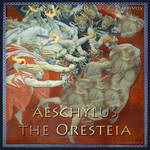 The Oresteia
The Oresteia
The Oresteia is a trilogy by Aeschylus, one of the foremost playwrights of ancient Greece. It encompasses three plays: Agamemnon, The Libation Bearers, and The Furies. It tells the tragic tale of the House of Atreus, whose inhabitants have been cursed and are doomed to play out their bloody, vengeful destinies. At the beginning of the first part, the Trojan War has ended and the Greek general, Agamemnon, is returning victorious to his wife Clytemnestra. Yet she finds it difficult to forgive his sacrifice of their daughter, Iphigenia, who was killed to ensure the Greek fleet fair winds in their voyage to Troy... | |
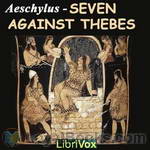 Seven Against Thebes
Seven Against Thebes
In this, the only extant tragedy from Aeschylus' trilogy about the House of Oedipus, Thebes is under siege from Polynices, a former prince of Thebes. After King Oedipus left his city and cursed the princes, Polynices and his brother, Eteocles, decided to rule alternately, switching at the end of every year. However, at the end of his year as king, Eteocles refused to turn power over to his brother and exiled him, fulfilling his father's curse that the two brothers could not rule peacefully. In the action of the play, Polynices and a group of Argive soldiers are attacking Thebes so that he can take his place as ruler... | |
By: Ann Radcliffe (1764-1823) | |
|---|---|
 A Sicilian Romance
A Sicilian Romance
A Sicilian Romance is a Gothic novel by Ann Radcliffe. It was her second published work, and was first published anonymously in 1790. The plot concerns the turbulent history of the fallen aristocrats of the house of Mazzini, on the northern shore of Sicily, as related by a tourist who becomes intrigued by the stories of a monk he meets in the ruins of their doomed castle. The introduction to the 'Worlds Classics' edition notes that in this novel "Ann Radcliffe began to forge the unique mixture of the psychology of terror and poetic description that would make her the great exemplar of the Gothic novel, and the idol of the Romantics"... | |
By: Anton Chekhov (1860-1904) | |
|---|---|
 Ivanov
Ivanov
Nicolai (anglicised Nicholas in this translation) Ivanov, a middle-aged public servant, is unhappy. His wife Anna, disinherited by her family after converting from Judaism, is dying of tuberculosis. He is deeply in debt. And his best friend’s daughter is infatuated with him. Comedy and tragedy ensue in truly Chekhovian fashion. An example of the young Chekhov’s maturing style, Ivanov is an early harbinger of themes that would recur throughout his work. | |
By: August Strindberg (1849-1912) | |
|---|---|
 Creditors
Creditors
Creditors is an 1889 tragicomedy by August Strindberg that plumbs the depths of the twisted triangular relationship between Tekla, her husband Adolph, and her ex-husband Gustav. | |
By: BS Murthy | |
|---|---|
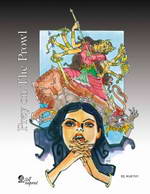 Prey on the Prowl - A Crime Novel
Prey on the Prowl - A Crime Novel
Who could have poisoned Ranjit the realtor, Shakeel the Inspector, Pravar the criminal and Natya his accomplice? Well the needle of suspicion tilted towards Pravar that was till he perished with his mate, but then who was the one? Could it be Radha under the scanner for her role in the death of her husband Madhu and his mistress Mala, Pravar's sister? Or was it Ranjit's spouse Kavya, who owing to Stockholm Syndrome, takes to Pravar her kidnapper. As these deaths by poisoning puzzle Dhruva, Radha, who worms her way into his life, avers that Kavya had the motive and the means to kill her spouse, her paramour and his wife besides the cop... | |
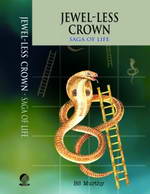 Jewel-less Crown: Saga of Life
Jewel-less Crown: Saga of Life
This fascinating saga of life exemplifies the material raise and moral fall of Gautam and Sneha and also the poignant end of the latter and the spiritual rise of the former that is after the fall. Besides, this piquant story depicts the tragic life of their son Suresh Prabhu and his eventual redemption through love for and of Vidya. Book One, Artha and Kama, is about conflict and resolution arising out of ambition and achievement, intrigue and betrayal, compulsion and compromise, sleaze and scandal, trial and sentence and regret and remorse spread over eighteen chapters... | |
By: Charles Morris (1833-1922) | |
|---|---|
 The San Francisco Calamity by Earthquake and Fire
The San Francisco Calamity by Earthquake and Fire
The first half of this book describes the devastating earthquake that hit San Francisco in 1906, and the subsequent destruction caused by fire. Various eyewitnesses and victims give their account on the tragedy. In the second half, a number of different other earthquakes and volcanic eruptions are retold, like the eruption of the Vesuvius that destroyed Pompeij or the explosion of the Krakatoa, together with scientific explanations for the causes of earthquakes and the eruption of volcanos. | |
By: Christopher Marlowe (1564-1593) | |
|---|---|
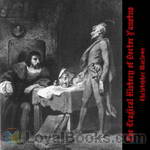 The Tragical History of Doctor Faustus
The Tragical History of Doctor Faustus
The Tragical History of Doctor Faustus, normally known simply as Doctor Faustus, is a play by Christopher Marlowe, based on the Faust story, in which a man sells his soul to the devil for power and knowledge. Doctor Faustus was first published in 1604, eleven years after Marlowe's death and at least twelve years after the first performance of the play. | |
 The Jew of Malta
The Jew of Malta
Christopher “Kit” Marlowe (baptised 26 February 1564 – 30 May 1593) was an English dramatist, poet, and translator of the Elizabethan era. The foremost Elizabethan tragedian before William Shakespeare, he is known for his magnificent blank verse, his overreaching protagonists, and his own untimely death. The Jew of Malta (1589) is an original story of religious conflict, intrigue, and revenge, set against a backdrop of the struggle for supremacy between Spain and the Ottoman Empire in the Mediterranean... | |
 Tamburlaine the Great
Tamburlaine the Great
Tamburlaine the Great is the name of a play in two parts by Christopher Marlowe. It is loosely based on the life of the Central Asian emperor, Timur 'the lame'. Written in 1587 or 1588, the play is a milestone in Elizabethan public drama; it marks a turning away from the clumsy language and loose plotting of the earlier Tudor dramatists, and a new interest in fresh and vivid language, memorable action, and intellectual complexity. Along with Thomas Kyd's The Spanish Tragedy, it may be considered the first popular success of London's public stage... | |
 Tragical History of Doctor Faustus (1616 version)
Tragical History of Doctor Faustus (1616 version)
The Tragicall History of the Life and Death of Doctor Faustus, commonly referred to simply as Doctor Faustus, is a play by Christopher Marlowe, based on the Faust story, in which a man sells his soul to the devil for power and knowledge. Doctor Faustus was first published in 1604, eleven years after Marlowe's death and at least twelve years after the first performance of the play. "No Elizabethan play outside the Shakespeare canon has raised more controversy than Doctor Faustus. There is no agreement concerning the nature of the text and the date of composition... | |
 Edward II
Edward II
Christopher Marlowe's Elizabethan tragedy focuses on the downfall of King Edward II, whose love for his favorite courtier, Piers Gaveston, leads to rebellion. | |
By: Clemence Dane (1888-1965) | |
|---|---|
 Bill of Divorcement
Bill of Divorcement
A Bill of Divorcement describes a day in the lives of a middle-aged British woman named Margaret "Meg" Fairfield, her daughter Sydney, Sydney's fiancé Kit Humphreys, Meg's fiancé Gray Meredith, and Meg's husband Hilary, who escapes after spending almost twenty years in a mental hospital. A 1932 film of the same name was directed by George Cukor and starred Katharine Hepburn and John Barrymore. | |
By: D. H. Lawrence (1885-1930) | |
|---|---|
 The Prussian Officer and Other Stories
The Prussian Officer and Other Stories
The collection of short stories – of which The Prussian Officer is one – was Lawrence’s first such book. A German officer and his orderly are the focus of the piece and, while socially the superior of his orderly, the officer demonstrates his is the distinctly baser character. (Introduction by Cathy Barratt) | |
By: Edgar Lee Masters (1868-1950) | |
|---|---|
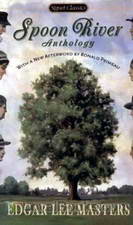 Spoon River Anthology
Spoon River Anthology
Two hundred and twelve residents of a small town tell their stories without fear of recrimination or ridicule. The only difference is that they're all dead! The two hundred and forty-four poems that form the Spoon River Anthology by Edgar Lee Masters is really a series of epitaphs about the citizens of a fictional town called Spoon River and deals with the “plain and simple annals” of small town America. Edgar Lee Masters grew up in a small town in Illinois. His father's financial problems forced the young Masters to abandon ideas of college and take up a job instead... | |
By: Elizabeth Cary (1585-1639) | |
|---|---|
 Tragedy of Mariam
Tragedy of Mariam
The Tragedy of Mariam (1613) is the first original drama written in English by a woman. Elizabeth Cary drew on Jewish histories by Josephus to create a closet drama (written to be read, rather than performed live) about Mariam, the second wife of Herod the Great. At the beginning of the play, Mariam believes that Herod has been killed by Octavius, and struggles with how to respond. On the one hand, she is relieved, as she is angry with Herod for killing her brother and grandfather. On the other, she knows that he loved her, and she feels caught by her sense of duty as his wife. When Herod unexpectedly returns, Mariam must decide what to do. | |
By: Émile Zola (1840-1902) | |
|---|---|
 L'Assommoir
L'Assommoir
Émile François Zola (French pronunciation: [emil zɔˈla]) (2 April 1840 – 29 September 1902) was an influential French writer, the most important exemplar of the literary school of naturalism. More than half of Zola’s novels were part of a set of twenty novels about a family under the Second Empire collectively known as Les Rougon-Macquart. L’Assommoir (1877) is the seventh novel in the series. Usually considered one of Zola’s masterpieces, the novel—a harsh and uncompromising study of alcoholism and poverty in the working-class districts of Paris—was a huge commercial success and established Zola’s fame and reputation throughout France and the world. | |
By: Epes Sargent IV (1813-1880) | |
|---|---|
 Velasco
Velasco
Inspired by the tale of El Cid, U.S. author Epes Sargent created this drama about a knight forced to conceal his true identity. The play debuted in 1837 at Boston’s Tremont Theatre in a production featuring visiting English actress Ellen Tree and E.L Davenport as King Ferdinand. - Summary by Kelly Taylor Cast: King Ferdinand Wayne Cooke Favillo James R. Hedrick De Lerma Alan Mapstone Velasco Jake Malizia Gonzalez Algy Pug Julio, Son of Gonzalez Andrew Latheron Hernando, his... | |
By: Ernest Legouve (1807-1903) | |
|---|---|
 Adrienne Lecouvreur
Adrienne Lecouvreur
This drama was written in 1848 for the great French tragedienne, Rachel, by Eugene Scribe and his writing partner, Ernest Legouve. Scribe is remembered for devising the compositional technique now known as the “well-made play” that dominated play-writing for most of the 19th century. This plot is loosely based on events in the life of the actress, Adrienne Lecouvreur of the Comédie-Française and the tragic outcome of her love affair with Maurice, Comte de Saxe Cast List Maurice de Saxe Andrew Latheron Prince de Bouillon Jake Malizia Abbe de Chazeuil Alan Mapstone Michonnet Adrian Stephens Poisson Greg Giordano Quinault James R... | |
By: Euripides (480-406 BC) | |
|---|---|
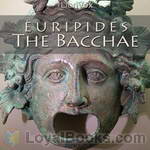 The Bacchae
The Bacchae
This tragedy is based on the mythological story of King Pentheus of Thebes and his mother Agave, and their punishment by the god Dionysus (who is Pentheus' cousin) for refusing to worship him. | |
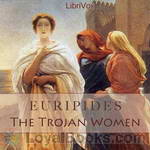 The Trojan Women
The Trojan Women
Euripides' play follows the fates of the women of Troy after their city has been sacked, their husbands killed, and as their remaining families are about to be taken away as slaves. However, it begins first with the gods Athena and Poseidon discussing ways to punish the Greek armies because they condoned Ajax the Lesser for dragging Cassandra away from Athena's temple. What follows shows how much the Trojan women have suffered as their grief is compounded when the Greeks dole out additional deaths and divide their shares of women. | |
 Medea
Medea
Euripides' tragedy focuses on the disintegration of the relationship between Jason, the hero who captured the Golden Fleece, and Medea, the sorceress who returned with him to Corinth and had two sons with him. As the play opens, Jason plans to marry the daughter of King Creon, and the lovesick Medea plots how to take her revenge. | |
By: Ford Madox Ford (1873-1939) | |
|---|---|
 The Good Soldier
The Good Soldier
The Good Soldier (1915) "... is set just before World War I and chronicles the tragedies of the lives of two seemingly perfect couples. The novel is told using a series of flashbacks in non-chronological order, a literary technique pioneered by Ford. It also makes use of the device of the unreliable narrator, as the main character gradually reveals a version of events that is quite different from what the introduction leads you to believe. The novel was loosely based on two incidents of adultery and on Ford's messy personal life.”Music in sections 1-5 "Minuet in G flat major and Valse Bluette" by Beethoven | |
By: Francis Beaumont (1584-1616) | |
|---|---|
 The Maid's Tragedy
The Maid's Tragedy
Beaumont and Fletcher's The Maid's Tragedy (first published 1619) is a sensational Jacobean sex tragedy. When gentleman soldier Melantius returns to Rhodes, he finds his dear friend Amintor is recently married - but not to his troth-plight love Aspatia (the maid of the title). Instead, the King has arranged a match between Amintor and Melantius' sister, the beautiful Evadne. On his wedding night, Amintor finds that his new wife has married him under false pretenses - and this unleashes a torrent of dire consequences, sexual, emotional, and ultimately political. | |
By: Francis Brett Young (1884-1954) | |
|---|---|
 The Tragic Bride
The Tragic Bride
The story centers on Gabrielle Hewish, only and lonely child of Sir Jocelyn Hewish, a loveable lush and owner of the peaceful Roscarna estate nestled in the Irish countryside. In due course, young Gabrielle falls in love with a Navy man whose untimely demise sends her into a depression, and the consequences of which alter her future, culminating in a fascinating and quite unpredictable relationship with Mrs. Payne and her troubled son Arthur. A story of understanding in it’s finest sense and aptly titled, The Tragic Bride is both interesting as a story and telling as a character study. | |
By: Frank Norris (1870-1902) | |
|---|---|
 The Octopus
The Octopus
Frank Norris based his 1901 novel The Octopus (A Story of California) on the Mussel Slough Tragedy of 1880, a bloody conflict between ranchers and agents of the Southern Pacific Railroad. The central issue was over the ownership of the ranches, which the farmers had leased from the railroad nearly ten years earlier with intentions of eventually purchasing the land. Although originally priced at $2.50 to $5 per acre, the railroad eventually opened the land for sale at prices adjusted for land improvements; the railroad’s attempts to take possession of the land led the ranchers to defend themselves as depicted in the book. | |
By: Friedrich Schiller (1759-1805) | |
|---|---|
 Mary Stuart
Mary Stuart
Schiller's tragedy depicts the final days of Mary, Queen of Scots, who has been imprisoned by her cousin, Queen Elizabeth I, because of her potential claim on the English throne. The action of the play revolves around an attempt to rescue Mary from prison and Elizabeth's indecision over whether or not to have her executed. The 1801 translation is by Joseph Mellish, a friend of Schiller's. | |
 Love and Intrigue
Love and Intrigue
Ferdinand is an army major and son of President von Walter, a high-ranking noble in a German duke's court, while Luise Miller is the daughter of a middle-class musician. The couple fall in love with each other, but both their fathers tell them to end their affair. The President instead wants to expand his own influence by marrying Ferdinand to Lady Milford, the duke's mistress, but Ferdinand rebels against his father's plan and tries to persuade Luise to elope with him. | |
By: George Bernard Shaw (1856-1950) | |
|---|---|
 Saint Joan: Preface
Saint Joan: Preface
Saint Joan is a play by George Bernard Shaw about 15th-century French military figure Joan of Arc. Premiering in 1923, three years after her canonization by the Roman Catholic Church, the play reflects Shaw's belief that the people involved in Joan's trial acted according to what they thought was right. He wrote in his preface to the play: “There are no villains in the piece. Crime, like disease, is not interesting: it is something to be done away with by general consent, and that is all [there is] about it... | |
By: Gustave Flaubert (1821-1880) | |
|---|---|
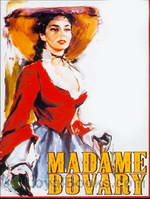 Madame Bovary
Madame Bovary
The strands woven together in Gustave Flaubert's famous, path breaking 1856 novel Madame Bovary include a provincial town in Normandy, France, a shy young doctor with an indifferent career and a lovely young woman who lives in a fantasy world based on the innumerable romantic novels she reads. Of course there is also the story of a dull marriage punctuated by passionate, adulterous love affairs. First published in serial form in a Parisian magazine and deemed to be the “perfect” novel, Flaubert's debut was received by both readers and critics with acclaim and admiration... | |
By: Henrik Ibsen | |
|---|---|
 A Doll's House
A Doll's House
Nineteenth century attitudes towards marriage, the role of women, morality and the search for identity are brilliantly explored in Henrik Ibsen's three act play, A Doll's House. It was highly controversial and received with a sense of outrage among opinion leaders in Europe. Many thinkers like August Strindberg lashed out at Ibsen for portraying the sacred institution of marriage in such a derogatory way. A Doll's House, written in the original Danish, was first performed at the Royal Theater in Copenhagen in 1879... | |
 The Master Builder
The Master Builder
Henrik Ibsen's The Master Builder, first published in 1892, is about architect Halvard Solness, who despite personal tragedy (including the death of his two sons) has risen to the top of his profession. He has succeeded partly through ruthless competition and exploitation and partly through a seeming ability to force his will on others. His unhappy wife Aline mourns for their lost life, and resents his interest in various young women, including his bookkeeper Kaia Fosli. Solness disregards the ambitions of other architects, including Knut Brovik and his son Ragnar, and seeks solace in the advice of family physician and friend Dr... | |
 Little Eyolf
Little Eyolf
Henrik Ibsen's 1894 play Little Eyolf tells the story of the Allmers family: the father, Alfred, his wife Rita, their crippled nine-year-old son Eyolf, and Alfred's sister Asta. As the play begins, Alfred has just gotten back from a trip to the mountains, and resolves to spend more time with his son, rather than on intellectual pursuits. Asta is romantically pursued by Borgheim, an engineer, while the cracks in Alfred and Rita's marriage gradually reveal themselves. The family receives a visit from the Rat-Wife, and are never the same again. | |